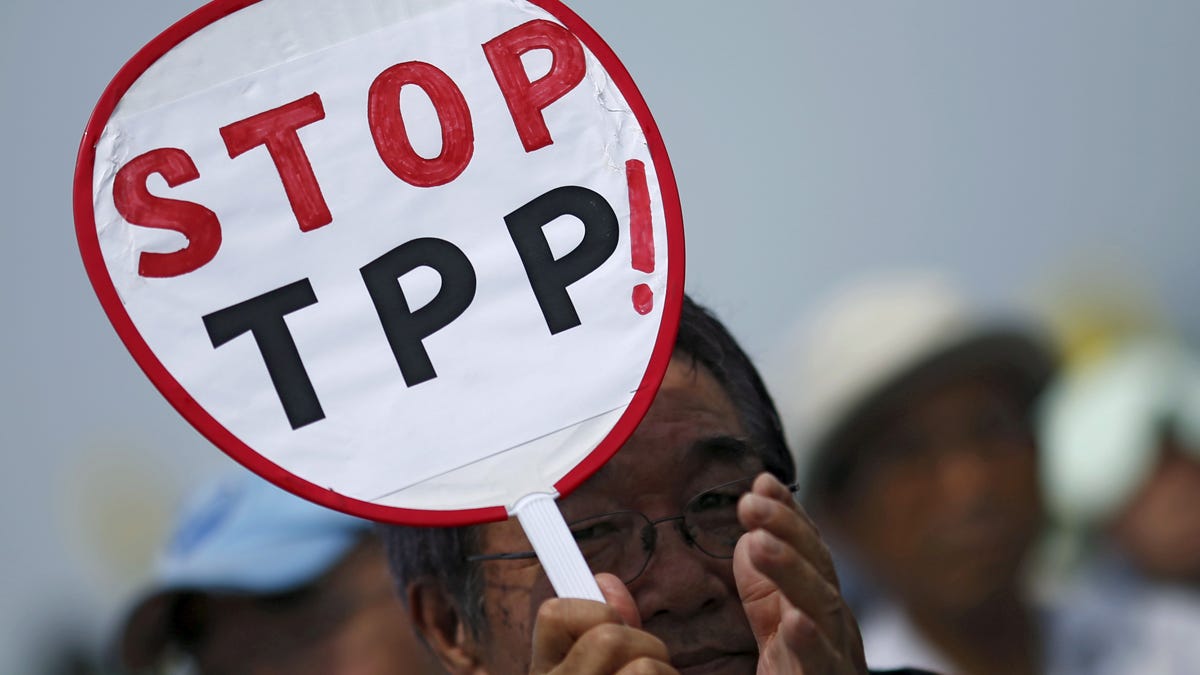Spotlight on digital rights as full Trans-Pacific Partnership text finally revealed
After years of secret closed-door negotiations, the full text of the Trans-Pacific Partnership has finally been revealed, shedding light on how the technology world will change under the massive trade deal.

The Trans-Pacific Partnership has met with protest across the Pacific Rim, from Japan to the US.
It has the potential to change your digital rights and bring in new criminal penalties for piracy, all while opening up foreign trade and changing the way Pacific countries do business overseas. Now, after years of negotiations, the Trans-Pacific Partnership is finally seeing the light of day.
Since negotiations on the TPP began more than five years ago, talks have been conducted out of public view and details on the complex trade agreement have stayed under wraps, with the only public information coming from documents leaked by Wikileaks.
All 30 chapters of the TPP were officially published by New Zealand on Friday, outlining the complex details of the deal and ruining the weekend plans of journalists and trade lawyers around the world.
Negotiated between 12 countries -- including Australia, the United States, Singapore, New Zealand, Brunei Darussalam, Canada, Chile, Japan, Malaysia, Mexico, Peru and Vietnam -- the TPP covers just under 40 percent of global GDP, according to numbers from Australia's Department of Foreign Affairs and Trade.
While different signatories have come on board over the years, the genesis of the TPP dates back to 2004, with negotiations taking place behind closed doors since 2010. Talks wrapped up last month in Atlanta, Georgia, with the news that all 12 countries had signed off on the text, with final legal approval and domestic treaty negotiations the only hurdles left.
The drafting process has long had its critics, with digital civil liberties groups dubbing the TPP "the dirtiest deal you've never heard of." Of most concern to technology sector has been the Intellectual Property chapter, leaked by Wikileaks in 2013, which copyright experts previously said was "frankly horrifying" in its details on the criminalisation of piracy.
The Electronic Frontiers Foundation also called out fine print in the TPP such as the "retroactive 20-year copyright term extension, bans on circumventing DRM [digital rights management], massively disproportionate punishments for copyright infringement, and rules that criminalize investigative journalists and whistleblowers."
In light of these conditions, the EFF said it was vital to "stop this agreement from getting signed, ratified, and put into force."
However, the final text of the IP chapter shows that many of the measures the EFF opposed have remained in place. Chapter 18 of the TPP [PDF] highlights that signatories must impose penalties for copyright infringement including "sentences of imprisonment as well as monetary fines sufficiently high to provide a deterrent to future acts of infringement."
The restrictions on DRM have also remained, meaning tighter controls around the "technical protection measures" that content creators put on digital products -- think region locks on DVDs, DRM on digital music or anything else that "controls access" to protected content.
The TPP also stipulates the length of copyright terms. In the United States, perpetual copyrights and patents are prohibited, but extensions to copyright are allowed. Under the TPP, copyrighted works will pass into the public domain 70 years after the death of the creator, extending the term for some countries such as New Zealand by a further 20 years.
The stipulations around copyright are just one part of the mammoth deal, which encompasses chapters on telecommunications, textiles, environment and labour. Now, each of the 12 signatories need to get the deal signed off at home, and with the TPP facing opposition from politicians and the public alike, there may still be a long road ahead.

